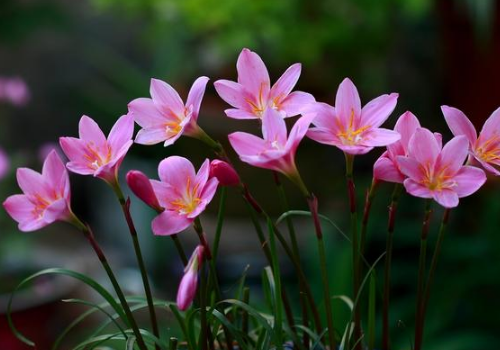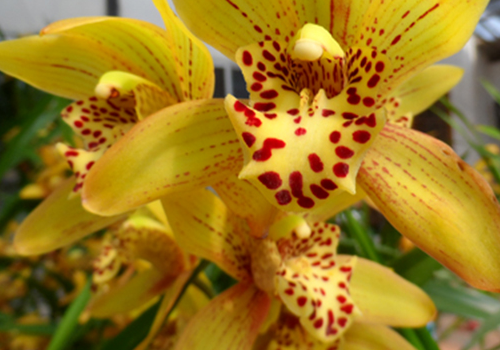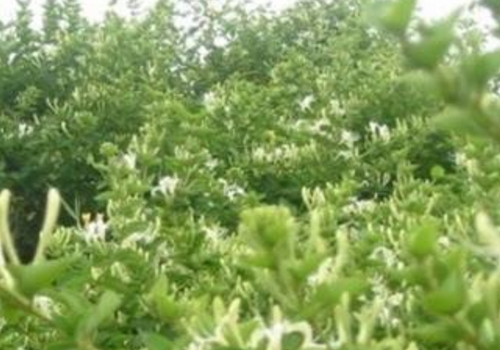How to raise leek lotus? can you keep it indoors?
Leek lotus leaves green, flowering, the flowers are pink, color matching is very eye-catching, beautiful and chic, let you feel beautiful every day. How to raise leek lotus? Can you put it indoors:
How to raise leek lotus:
1. The main points of soil culture: the quality of cultivated soil is fertile sandy loam. The edge of the flower bed is planted with 3-5 balls per hole, the distance between the holes is about 15 cm, and 5-7 balls are planted in pots for every 17 cm. Pay attention to irrigation to maintain humidity after planting. The cultivation site should have enough sunshine, it is not easy to divide the bulbs in the shade, and it is not easy to bloom. When the plants are clustered and crowded, the ramets must be forced. Strong in nature, resistant to drought and high temperature, easy to cultivate.
2. Propagation method: it can be planted by split plant or bulb, which can be carried out all the year round, but it is the best in spring. As long as the root of the ball is dug up, 3-5 balls are planted in each place and watered to maintain proper humidity, it is very easy to survive. When digging up the bulbs, be careful not to hurt them. If there are too many leaves and flower stems, cut off the upper part and keep the complete bulb and 6-8 cm leaves for planting. If the bulb has germinated buds and fully watered after branching, it can still blossom.
3. Key points of fertilization: organic fertilizer such as oil meal, compost or nitrogen, phosphorus and potassium fertilizer can be used once every 2-3 months. Increasing phosphorus and potassium fertilizer in proportion can promote bulb hypertrophy and blossom well.
4. Watering points: potted leek lotus should have sufficient sunshine and fat water. After a batch of flowers fade, the water should be controlled for 50 days and 60 days, and then the normal water supply should be restored. Such alternation of dry and wet can promote multiple flowering, which can blossom 2 or 3 times a year.

Can you put the leek lotus indoors:
In fact, leek lotus is not toxic, then, indoor culture is also possible, and will not produce any greater harm.
But indoor breeding leek lotus, need to pay attention to, leek lotus itself prefer sufficient light growth environment, can withstand semi-shade. Sometimes the indoor light is not enough, if the light is not enough, it may make it grow poorly.
Therefore, when leek lotus is cultivated indoors, we need to pay attention to maintenance and management.
Now you know how to raise leek lotus.
Is the leek lotus poisonous? can the leek lotus be put in the bedroom / non-toxic in the room?
For leek lotus, flower friends should be no stranger, its green leaves, beautiful flowers, colorful flowers, is a kind of highly ornamental flowers. In life, many people want to raise leek lotus, but in indoor fragrant snow orchid, there are several questions that we need to pay attention to, one is whether leek lotus is poisonous? Second, can leek lotus be put in the bedroom? For the sake of everyone's health, the editor will solve the doubts for you today.
Is the leek lotus poisonous? it is non-toxic
The beauty of leek lotus is fascinating. The emerald green leaves and pink flowers are all loved by people. However, because the flowers of leek lotus are too gorgeous, many flower friends worry that it is poisonous. Is it poisonous? In this regard, the editor can obviously tell you that leek lotus is not only non-toxic, but also has a certain medicinal value, can be used as medicine, has the role of detoxification.
Note: although leek lotus is non-toxic and can be used medicinally, it is not suitable for overuse, because excessive leek lotus will have a serious negative impact on human body. Therefore, friends who want to take leek lotus had better use it under the guidance of a professional doctor, which is safe and reliable.
Can you put the leek lotus in the bedroom? it is not recommended.
Leek lotus is not toxic, can it be put in the bedroom? To this problem, we should consider the size and ventilation of the bedroom, because the bedroom is the place where people sleep, and plants can not be placed casually here. If the bedroom is big enough, or more ventilated, raising a pot of leek lotus is obviously very good, smell its faint fragrance of flowers, people's sleep will be very good.
However, the general family bedroom is not ventilated, and relatively narrow. In the evening, leek lotus will breathe, absorb oxygen and release carbon dioxide, which will cause competition for oxygen with people, thus affecting people's sleep. So can I put the leek lotus in the bedroom? It depends on the bedroom.
Third, can leek lotus be cultured indoors, yes / many benefits
Although leek lotus is not suitable for raising in the bedroom, but in the large space, ventilated indoor, raising a pot of leek lotus is a good choice. Not only that, leek lotus is resistant to semi-shade, so it is very suitable for indoor breeding, and there are many benefits for people, such as:
1. Strong ornamental
If you want to talk about the benefits of raising leek lotus indoors, first of all, it is naturally its ornamental. As shown in the picture, the pink flowers of leek lotus look extraordinarily beautiful against the green leaves. Get up early in the morning, looking at the beauty of leek lotus, the mood of the day will be very happy.
2. Purify the air
As a beautiful potted plant, leek lotus has the generality of a plant. It can absorb carbon dioxide and release fresh oxygen during photosynthesis. Not only that, leek lotus can also absorb carbon monoxide, formaldehyde and other harmful gases, although the effect is not as strong as green pineapple, aloe, drug grass, but the role of air purification is still very obvious.
3. Beautify the home
Raise a pot of leek lotus at home, in addition to watching, its beauty can also be matched with indoor home, for us to create a green, full of vitality indoor environment. In the opening of the moment, looking at several pots of blooming leek lotus, as if into a beautiful garden. Living in this environment, people will be very relaxed and sleep much better.
4. Increase vitality
The advantage of raising leek lotus indoors can not only purify the air and beautify the home, but also edify our temperament and improve our temperament. Not only that, keeping leek lotus for a long time can also regulate mood, relieve stress and increase vitality. It can be said that raising leek lotus can prevent the environment from being too dull, which will help to prolong the life of flower growers.
Summary: if the bedroom is large or ventilated, it is good to keep a pot of leek lotus, but if the bedroom is not big, the editor suggests that we should not keep it. As to whether the leek lotus is poisonous, the editor has introduced it here. Friends who are excited might as well raise a pot and try it, but they will not raise it. They can also take a look at the breeding methods of leek lotus, hoping to bring help to everyone.
Is leek lotus poisonous? how to raise leek lotus?
Is leek lotus poisonous?
Leek lotus is also known as wind and rain flowers, the leaves are somewhat like leeks, and the flowers are more beautiful. So, is leek lotus poisonous? Is it possible to breed indoors? Can I eat leek lotus?
Is leek lotus poisonous?
Is the leek lotus poisonous? The answer is no. Leek lotus itself has no toxicity, but also has a certain medicinal value, can be used as medicine, has the role of detoxification.
Can leek lotus be cultured indoors?
In fact, leek lotus is not toxic, then, indoor culture is also possible, and will not produce any greater harm.
But indoor breeding leek lotus, need to pay attention to, leek lotus itself prefer sufficient light growth environment, can withstand semi-shade. Sometimes the indoor light is not enough, if the light is not enough, it may make it grow poorly.
Therefore, when leek lotus is cultivated indoors, we need to pay attention to maintenance and management.
Can I eat leek lotus?
Leek lotus is not poisonous, then someone will want to know if this leek lotus can be eaten, so can leek lotus be eaten?
On this point, in fact, there is no clear answer, most tend to, leek lotus can be eaten, but think that the taste of leek lotus is not very good, unlike leeks, it is recommended not to eat more.
If you want to try leek lotus, you'd better ask a doctor or experienced people to avoid adverse reactions.
What about the withered and yellow leaves of leek lotus?
"Xiaobian, what if the leaves of our leek lotus turn yellow and dry?" In the face of such an urgent inquiry, the editor is also quick to code this short article. Don't say much, let's take a look.
The reason why the leaves of leek lotus turn yellow is that there is too much water.
Leek lotus is resistant to dry, but afraid of waterlogging, taboo stagnant water. If it is watered too much, the roots of leek lotus will be waterlogged, resulting in withered and yellow leaves.
Poor ventilation
Leek lotus likes a cooler environment and needs to maintain a certain degree of humidity.
If the weather is muggy, the room is too dry and the ventilation condition is poor, it is likely to affect its normal and healthy development.
Too much or lack of fertilizer
Although leek lotus has rough skin and thick meat, as a plant, its healthy growth also needs certain fertilizer nutrients. If there is too little or too much fertilizer, it may lead to the emergence of yellow leaves.
The solution to the withered and yellow leaves of leek lotus leaves to ensure a certain amount of moisture.
The newly transplanted leek lotus needs to be watered thoroughly at once, while the normal growth leek lotus should be dry and wet, not too much watering.
Moderate fertilization
Just like human growth and development, too much or too little nutrient intake will affect growth.
More natural humus should be added to the soil. Not chemical fertilizers.
Now we should generally know why the leaves of leek lotus in our family are withered and yellow. Then go and "save" this beautiful little plant!
Family culture method of leek lotus
Leek lotus is a kind of plant with many uses and strong character. So the question is, how to raise such a "casual" leek lotus at home? Let's take a look!
The overall growth habits of leek lotus show a warm, moist and sunny environment. Not afraid of extreme heat, strong cold resistance. It is very convenient in family planting.
Temperature requirements of Chinese chive lotus culture
Leek lotus likes a warm environment. Generally speaking, it blossoms in September, the 6th month of each year.
The most suitable temperature for the growth of leek lotus is 16-28 ℃, which is not cold-resistant, and the overwintering temperature should not be lower than 5 ℃.
If the indoor can maintain more than 15 ℃ in winter, leek lotus can also continue to grow healthily. It can even blossom.
Light requirements of Chinese chive lotus culture
Leek lotus likes the sunny environment, if the growth environment is shady, then the quality of the seed balls will be poor.
Although the semi-shade can also blossom, but the number of flowers is small, the florescence is short.
Too much darkness may lead to non-flowering results.
Water requirement of Chinese chive lotus culture
Leek lotus likes the soil environment which is slightly dry, resistant to drought and afraid of waterlogging.
During the growing period, the soil should be dry and wet, and there must be no stagnant water. Reduce the amount of water after September, from November to February of the following spring, to ensure that it is dry and slightly moist.
Requirements of soil for cultivation of leek lotus
The most suitable soil for leek lotus should be sandy soil with good drainage and rich in humus.
However, the character of leek lotus is tenacious, and the requirement of soil in family breeding is not high. It can be adapted from slightly acidic to weakly alkaline soil, from sandy soil to light clay.
A layer of hard plastic foam or broken bricks can be placed at the bottom of the basin for ventilation and drainage.
The method of hydroponic culture of leek lotus
As a typical bulbous plant, leek lotus can grow as long as the root has enough water. Although it avoids waterlogging, hydroponic cultivation is a completely different planting method, so as long as you pay more attention to it, leek lotus can also be hydroponized. Let's talk about the hydroponic culture method of leek lotus!
Leek lotus itself is mixed with pink or pure white florets in the green leaves, showing a fresh and elegant feeling as a whole. If it is hydroponically cultured, the spherical roots of leek lotus can be seen from the transparent container, and the leaves will be clearer.
One of the methods of hydroponic culture of leek lotus
Prepare a longer transparent container with a more beautiful appearance. A layer of colored stones or pebbles can be laid at the bottom of the container to add beauty.
In spring, first plant the prepared leek lotus bulbs in a basin. To ensure that the root system of leek lotus can be fully extended. Then the root is compacted with soil to ensure that the surface is smooth.
After that, put the basin in the pool, shake it gently, rinse off the surface soil, and put it into the selected container.
Don't have too much water in the container, 3/4 is fine.
The second method of hydroponic culture of leek lotus
In order to achieve a better ornamental effect, it is best to choose the appropriate equipment according to the plant variety, shape and so on. For leek lotus, transparent glass container is a good choice.
First, do a good job of removing the soil and washing the roots of the leek lotus, gently shake the dug-out plants with your hands, shake off the soil from the roots, and expose all the roots. Then rinse with clean water. There must be no dirt left.
After pruning the roots, stems and leaves, soak the roots, stems and leaves with 0.1% potassium permanganate solution for 10-15 minutes, then rinse with clean water, and then plant in the bottle.
This method of hydroponics requires the use of a special culture medium.
- Prev

How to compound flowers and rotten roots of Cymbidium
Cymbidium, I believe many people have seen it, it is very beautiful when it blossoms. How can Cymbidium reblossom? What about the rotten roots? How to compound flowers of Cymbidium: to ensure sufficient light, Cymbidium is a plant that likes the sun, but the high temperature in summer should be properly shaded to avoid scorching the leaves.
- Next

When does the flower bloom and reproduce?
Honeysuckle, I believe many people have seen, is more common. When does honeysuckle flower? How to reproduce? When does honeysuckle bloom: honeysuckle generally begins to bloom in late May and ends in mid-October. The flowering period is about 150 days. Usually, the first crop flowers in late May and the second crop flowers in mid-late July.
Related
- Fuxing push coffee new agricultural production and marketing class: lack of small-scale processing plants
- Jujube rice field leisure farm deep ploughing Yilan for five years to create a space for organic food and play
- Nongyu Farm-A trial of organic papaya for brave women with advanced technology
- Four points for attention in the prevention and control of diseases and insect pests of edible fungi
- How to add nutrient solution to Edible Fungi
- Is there any good way to control edible fungus mites?
- Open Inoculation Technology of Edible Fungi
- Is there any clever way to use fertilizer for edible fungus in winter?
- What agents are used to kill the pathogens of edible fungi in the mushroom shed?
- Rapid drying of Edible Fungi

